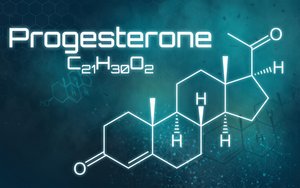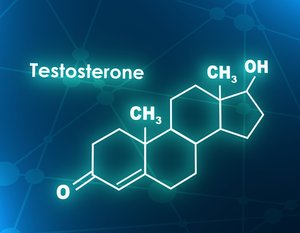By Genester Wilson-King, MD FACOG
Your sex hormones are your friend, not your enemy! Let’s get to know them.

Estrogen
Did you know that estrogen is produced in the ovaries and adrenal glands? There are three types of estrogen found in the female body: estrone, estradiol, and estriol. Estradiol is the most potent and active of the estrogens. Estradiol levels fall dramatically at the onset of menopause but do so in a gradual manner. Males have estradiol too, but they have an extremely small amount compared to females. Their estrogen is produced from the conversion of testosterone.
The decline in hormones, especially estradiol is the fundamental cause of menopausal symptoms and detrimental health effects. Common symptoms include hot flashes, insomnia, vaginal dryness, bladder problems, difficulty concentrating, and anxiety. Chronic diseases such as cardiovascular issues, stroke, osteoporosis, and Alzheimer’s all increase in the absence of estrogen.

Progesterone
Did you know that progesterone is another hormone that is equally important as estrogen for the aging woman? Progesterone is a unique hormone. It is produced by the ovaries and is used by the body to balance estrogen. It can also relieve menopause symptoms, protect against cancer, prevent osteoporosis, and improve overall well-being.
Progesterone is a hormone that has calming, anti-anxiety, and sometimes mood-stabilizing effects. It may help manage PMS. Most females 40 years and up should take progesterone (when they are estrogen-dominant). This is when estrogen dominance begins to happen which leads to varying, oscillating moods. Progesterone can be very useful to help provide balance.

Testosterone
Did you know that testosterone is a very important wellness hormone for all genders? In females, testosterone is produced by the ovary and the adrenal glands— the same place where estrogen and progesterone are produced. Testosterone contributes to encouraging sex drive, helps to ease menopause symptoms, improves bone density, and boosts vitality, energy, and well-being for an overall zest for life! Testosterone is also great for preventing thinning skin and wrinkles. It has been shown to increase collagen and elastin in the skin.
Testosterone has always been reported as being crucial for males. The clinical picture of andropause syndrome (also called hypogonadism, male menopause, or simply androgen deficiency) is characterized by diminished sexual desire, erectile dysfunction, increased fatigue, depression, and skin alterations (drying, wrinkling, thinning). There is also a decrease in cognitive function, lean body mass, body hair, and bone mineral density that results in osteoporosis. Many males can experience increased visceral fat which can lead to obesity.
Testosterone replacement can slow the physical and mental decline of andropause. Testosterone helps increase sexual desire and function. It has also been shown to increase muscle strength and size, decrease fat, and boost the desire to exercise (i.e. the motivation to do something other than sit on the couch). Optimum testosterone levels have been shown to potentially decrease the risk for cardiovascular disease and osteoporosis, reduce obesity, increase HDL cholesterol, and normalize blood clotting.
When Hormone Therapy Comes In
Hormone therapy (HT) should be part of an overall health program that includes addressing the spirit, soul, and body. Balancing the three is imperative for wellness. Wellness is the ultimate goal rather than just being healthy. “Health is more than absence of disease,” said Joycelyn Elders. Achieving and maintaining wellness is the journey the Victory Rejuvenation Center encourages people to make.
Why are we afraid of our hormones? There are many benefits of hormone therapy, but it has to be done properly. Too much of anything is not ideal, whether it be too much food, alcohol, exercise, work, fun, and even water. For example, water is essential for all life on earth. Yet water intoxication is a very real and potentially fatal condition if you drink too much of it.
If you are interested in hormone therapy, you should find a good hormone specialist. The right professional in this realm will walk you through the process so you feel comfortable and excited about how much better you will feel. Baseline laboratory tests and then periodic monitoring of the results followed by further testing are important. The Victory Rejuvenation Center consults with patients from all over the country.
Embrace your hormones while you have them. Honor them. Appreciate them. When you lose them, consider supplementing them. You will feel so much better!
References:
- Rouzier, Neal MD. “Bioidentical Hormone Replacement Therapy for men and women”, 2010.
- Rouzier, Neal MD. “Natural Hormone Replacement For Men and Women. How to Achieve Healthy Aging” 2007. World Link Medical Publishing Salt Lake City.
- Sundström-Poromaa, I., Comasco, E., Sumner, R., & Luders, E. (2020). Progesterone–Friend or foe?. Frontiers in Neuroendocrinology, 59, 100856.
- Nelson, L. R., & Bulun, S. E. (2001). Estrogen production and action. Journal of the American Academy of Dermatology, 45(3), S116-S124.
- Shuster, A., Patlas, M., Pinthus, J. H., & Mourtzakis, M. (2012). The clinical importance of visceral adiposity: a critical review of methods for visceral adipose tissue analysis. The British journal of radiology, 85(1009), 1-10.
- Bernard, P., Scior, T., & Do, Q. T. (2012). Modulating testosterone pathway: a new strategy to tackle male skin aging?. Clinical Interventions in Aging, 351-361.
